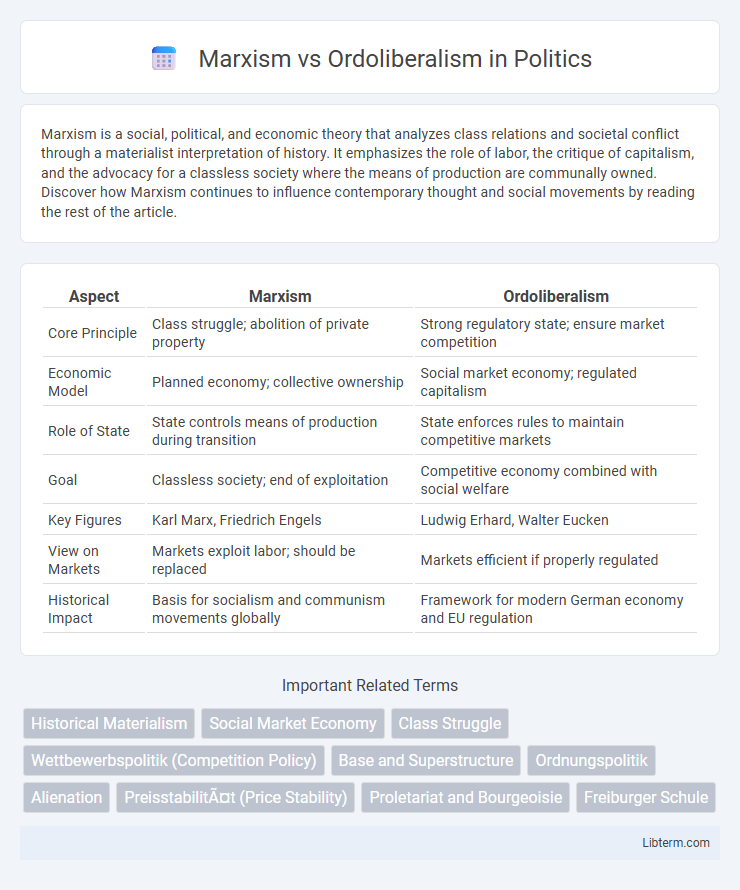Marxism is a social, political, and economic theory that analyzes class relations and societal conflict through a materialist interpretation of history. It emphasizes the role of labor, the critique of capitalism, and the advocacy for a classless society where the means of production are communally owned. Discover how Marxism continues to influence contemporary thought and social movements by reading the rest of the article.
Table of Comparison
| Aspect | Marxism | Ordoliberalism |
|---|---|---|
| Core Principle | Class struggle; abolition of private property | Strong regulatory state; ensure market competition |
| Economic Model | Planned economy; collective ownership | Social market economy; regulated capitalism |
| Role of State | State controls means of production during transition | State enforces rules to maintain competitive markets |
| Goal | Classless society; end of exploitation | Competitive economy combined with social welfare |
| Key Figures | Karl Marx, Friedrich Engels | Ludwig Erhard, Walter Eucken |
| View on Markets | Markets exploit labor; should be replaced | Markets efficient if properly regulated |
| Historical Impact | Basis for socialism and communism movements globally | Framework for modern German economy and EU regulation |
Introduction to Marxism and Ordoliberalism
Marxism centers on class struggle and the critique of capitalism, emphasizing the abolition of private property to achieve a classless society. Ordoliberalism advocates for a strong regulatory framework to ensure free-market competition, prioritizing economic order and social policy within a capitalist system. Both ideologies address economic organization but diverge fundamentally in their views on state intervention and property rights.
Historical Origins and Development
Marxism originated in the mid-19th century through the works of Karl Marx and Friedrich Engels, emphasizing class struggle and the critique of capitalism's exploitation and alienation. Ordoliberalism emerged in Germany during the 1930s and 1940s, influenced by the Freiburg School, advocating for a strong legal framework to ensure market competition and prevent monopolies while maintaining a social market economy. The historical development of Marxism shaped socialist and communist movements worldwide, whereas Ordoliberalism influenced post-World War II West Germany's economic policies, balancing free markets with regulatory oversight.
Core Philosophical Foundations
Marxism centers on the critique of capitalism, emphasizing class struggle, the abolition of private property, and the establishment of a classless society through collective ownership of the means of production. Ordoliberalism advocates for a strong legal framework to ensure market competition, individual property rights, and the state's role in maintaining order without direct economic intervention. Both philosophies diverge fundamentally on the role of the state and market, with Marxism prioritizing social equality and ordoliberalism stressing economic freedom within regulated competition.
Economic Theories Compared
Marxism critiques capitalism by emphasizing class struggle, advocating for the abolition of private property and collective ownership of production means to achieve economic equality. Ordoliberalism supports a competitive market economy regulated by a strong legal framework ensuring fair competition, social welfare, and price stability without direct state ownership of resources. While Marxism envisions a classless society through revolutionary change, Ordoliberalism promotes incremental reforms within a capitalist system to maintain order and prevent monopolies.
Approaches to State Intervention
Marxism advocates for extensive state intervention to achieve proletarian control and redistribute resources, emphasizing the abolition of capitalist structures to establish a classless society. Ordoliberalism promotes a strong legal framework where the state ensures market order and competition without direct economic control, aiming to prevent monopolies and maintain economic stability. Both approaches recognize the state's role but differ in intervention extent--Marxism seeks transformative control, while Ordoliberalism advocates regulatory oversight.
Views on Capitalism and the Market
Marxism critiques capitalism as an exploitative system that generates class conflict through private ownership of the means of production and market-driven inequality. Ordoliberalism supports a regulated free market, emphasizing the state's role in maintaining competitive order to prevent monopolies and ensure market efficiency. Marxism calls for the abolition of capitalism, while Ordoliberalism advocates for a strong legal framework that preserves capitalism's functioning within social boundaries.
Social Justice and Class Structure
Marxism emphasizes social justice through the abolition of class structures and collective ownership of production means, advocating for a classless society where wealth and power are equally distributed. Ordoliberalism promotes social justice by ensuring a competitive market economy regulated by a strong legal framework to prevent monopolies and protect individual freedoms, maintaining class distinctions but fostering social mobility. The Marxist approach targets systemic economic inequalities, while Ordoliberalism seeks to balance free market efficiency with social welfare within existing class structures.
Key Thinkers and Influences
Marxism, rooted in the works of Karl Marx and Friedrich Engels, emphasizes class struggle, historical materialism, and the critique of capitalism's exploitative structures. Ordoliberalism, developed by German economists like Walter Eucken and Franz Bohm, advocates for a strong state ensuring fair market competition and preventing monopolies without direct economic intervention. Both ideologies have profoundly influenced economic policies, with Marxism shaping socialist movements and revolutions, while Ordoliberalism has informed the regulatory frameworks of modern social market economies, especially in post-war Germany.
Modern Applications and Influence
Marxism continues to influence contemporary social movements advocating for wealth redistribution and worker rights, particularly in academic circles and progressive politics. Ordoliberalism shapes modern economic policies within the European Union, emphasizing regulatory frameworks that ensure market competition and prevent monopolies. Both ideologies inform debates on balancing state intervention and free markets in addressing inequality and economic stability today.
Criticisms and Contemporary Relevance
Marxism faces criticism for its perceived economic determinism and challenges in practical implementation, while Ordoliberalism is often critiqued for its emphasis on state regulation potentially limiting market flexibility. Despite these critiques, Marxism continues to influence debates on income inequality and labor rights globally. Ordoliberalism shapes contemporary European economic policies by advocating a strong legal framework to ensure competitive markets and prevent monopolies.
Marxism Infographic

 libterm.com
libterm.com